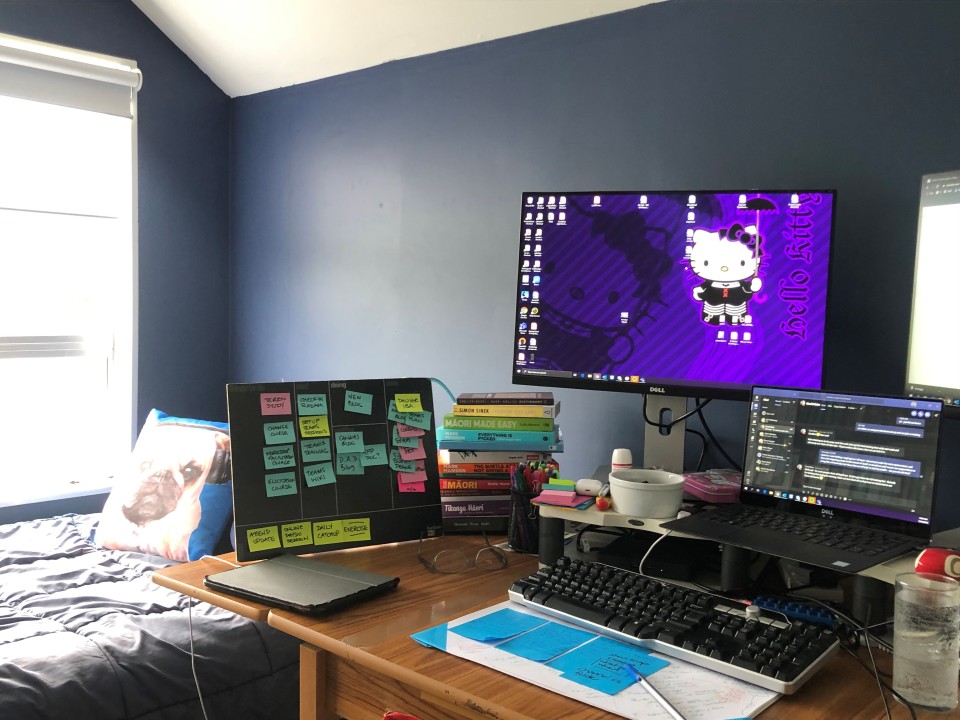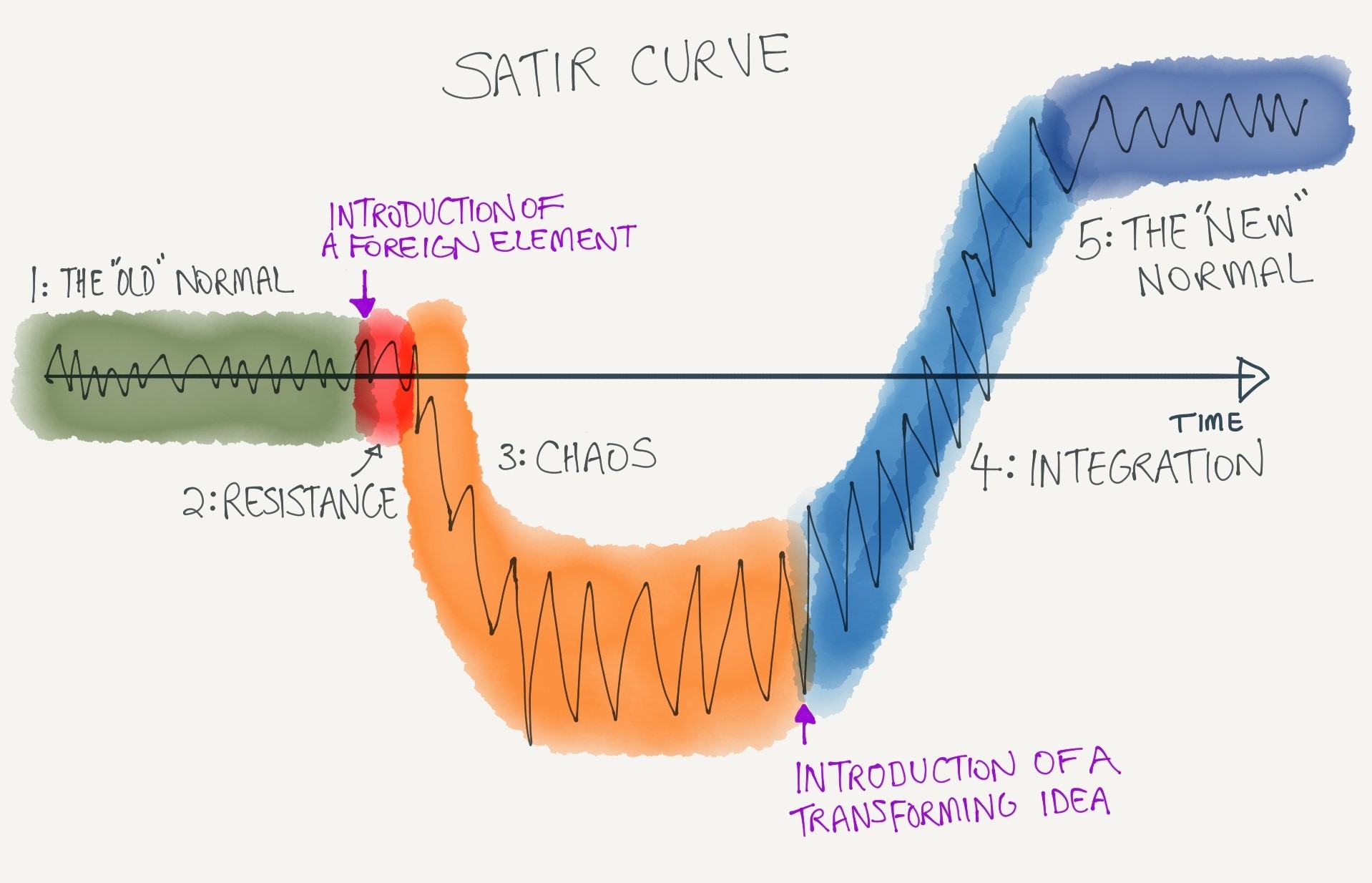Share this
Sustaining our new ways of working
by Kirsten Eriksen on 08 April 2020

This article is republished from my original Sustaining our new ways of working post in LinkedIn.
Most of Equinox IT has effectively been in lockdown since we did our Remote Working test a little over two weeks ago. As we approach what is hopefully the midpoint in this phase 4 lockdown as a nation, I can see a few things coming through, references to Groundhog Day are pretty blatant, but there are also many more subtle signs that it's becoming a bit of a strain. This isn't good for anyone as at a minimum we have two more weeks of this, and most people agree, likely more.
Talking to one of my colleagues the other day, we talked about how we'd "formed" through our set up phase, "stormed" through adjusting to working at home, and had started to "norm", in some cases through the development of new ways of working, interacting and getting that which needed to be done, done. I fear that our desire to be social animals and interact in person will be the thing that stops us from completing our "norming", which will prevent us moving into "performing". (Thanks to Tuckman for his model.)
One reason I think people are finding the transition hard is because the change was thrust upon us. In a world of co-creation and inclusive ways of working, we all know that authoritative change is often not the ideal way to manage successful transformative initiatives; although given the circumstances and a scale of change that affects every New Zealander, it was likely the best approach on this occasion. Clearly we're starting to see some benefits from the change, in terms of some potential COVID-19 containment. Nevertheless, because we were not involved in the change decision, we likely feel a loss of control, and as the Satir Curve shows below, we may experience some resistance, leading to this being seen as 'a bit of a strain'.

We also keep hearing "he waka eke noa" (we're all in this together), and yet we're together apart. This is hard for us. Human beings are social creatures. Even at what is labelled level 3, many us will need to continue to work remotely where possible. The generally accepted (in my networks at least) understanding is that this is likely to remain the case for a number of months.
This being the case I've got a few ideas for how we help ourselves cope with what may be a protracted new reality.
Uniting on a transforming idea
Again referring to the Satir Curve image above, we can see that the impact of change, and the ability to move towards a state of "performing", gets better when there is a transforming idea, when people understand "what's in it for them". The transforming idea allows people to assimilate the change. For the majority of New Zealanders impacted by the change, the transforming idea is likely knowing they are doing their part to reduce the spread of COVID-19, and from a personal perspective reducing the health risk to themselves and their loved ones. Keeping this transforming idea front of mind will help you sustain the new way of working during a potentially protracted lockdown or remote working period.
Perspective:
Keeping things in perspective is hard when we don't have the facts but the one thing we do know is that, eventually, this too shall pass. I haven’t personally seen anyone saying we don't need to be trying to control the spread of this horrible disease (although I'm sure they're out there). There have been relatively few stories of people breaking the rules, and many I've heard are more speculation that the rules are being broken. My advice here is: rather than concentrating on "when" we will be able to go out and see people again, try and shift your thoughts to “it will happen”. We will go back to being able to interact with each other in person. This is a marathon, not a sprint, and it will end.
Outlook:
Research (see Shawn Anchor's TED talk for more ) has shown that our brains in a positive state are 31% more productive than in a negative, neutral or stressed state; your intelligence rises, your creativity rises, your energy levels rise. In fact, we've found that every single business outcome improves.
So, how do we hack our brains in this difficult and stressful time? Here's some advice directly from Shawn's TED talk:
"In just a two-minute span of time done for 21 days in a row, we can actually rewire your brain, allowing your brain to actually work more optimistically and more successfully. We've done these things in research now in every company that I've worked with, getting them to write down three new things that they're grateful for 21 days in a row, three new things each day. And at the end of that, their brain starts to retain a pattern of scanning the world not for the negative, but for the positive first.
Journaling about one positive experience you've had over the past 24 hours allows your brain to relive it. Exercise teaches your brain that your behaviour matters. We find that meditation allows your brain to get over the cultural ADHD that we've been creating by trying to do multiple tasks at once and allows our brains to focus on the task at hand. And finally, random acts of kindness are conscious acts of kindness. We get people, when they open up their inbox, to write one positive email praising or thanking somebody in their support network."
Be intentional in this practice. Set aside time for it each day and force yourself to do it until it becomes habit. Expect that it will be hard at first, but it will get easier
Well-being:
We all know things are easier when we are well, healthy, getting regular exercise and taking care of our mental health. Now more than ever this is important. Schedule time in your day for exercise, whether it’s a walk to the letter box and back or something more adventurous like a walk around the block (but please follow the advice and stay local). Do things for yourself. Do what brings you joy or peace, whether that’s cooking, reading a novel, watching TV, or something completely different. Looking after yourself is just as important as looking after others.
One final tip on mental health: don't be counting down the days till the four weeks is up (here in NZ, other countries have different timelines). You'll notice how the language of officials is not certain on the timeframe. If it is extended and you've been counting down, you'll find it more psychologically harmful than if you're not counting down.
Hopefully, these things will help both myself and others to get through these unprecedented times. Another whakataukī (Māori proverb) that applies here is "he manga wai koia kia koia e whitikia", which means literally "It is a big river indeed that cannot be crossed". In other words, we can and will overcome the difficulties we are facing.
Kirsten Eriksen is a Senior Consultant specialising in business analysis and Agile coaching, based in Equinox IT’s Wellington, New Zealand office.
Share this
- Agile Development (153)
- Software Development (126)
- Agile (76)
- Scrum (66)
- Application Lifecycle Management (50)
- Capability Development (47)
- Business Analysis (46)
- DevOps (43)
- IT Professional (42)
- Equinox IT News (41)
- Agile Transformation (38)
- IT Consulting (38)
- Knowledge Sharing (36)
- Lean Software Development (35)
- Requirements (35)
- Strategic Planning (35)
- Solution Architecture (34)
- Digital Disruption (32)
- IT Project (31)
- International Leaders (31)
- Digital Transformation (26)
- Project Management (26)
- Cloud (25)
- Azure DevOps (23)
- Coaching (23)
- IT Governance (23)
- System Performance (23)
- Change Management (20)
- Innovation (20)
- MIT Sloan CISR (15)
- Client Briefing Events (13)
- Architecture (12)
- Working from Home (12)
- IT Services (10)
- Data Visualisation (9)
- Kanban (9)
- People (9)
- Business Architecture (8)
- Communities of Practice (8)
- Continuous Integration (7)
- Business Case (4)
- Enterprise Analysis (4)
- Angular UIs (3)
- Business Rules (3)
- Java Development (3)
- Lean Startup (3)
- Satir Change Model (3)
- API (2)
- Automation (2)
- GitHub (2)
- Scaling (2)
- Toggles (2)
- .Net Core (1)
- Diversity (1)
- Security (1)
- Testing (1)
- February 2024 (3)
- January 2024 (1)
- September 2023 (2)
- July 2023 (3)
- August 2022 (4)
- August 2021 (1)
- July 2021 (1)
- June 2021 (1)
- May 2021 (1)
- March 2021 (1)
- February 2021 (2)
- November 2020 (2)
- September 2020 (1)
- July 2020 (1)
- June 2020 (3)
- May 2020 (3)
- April 2020 (2)
- March 2020 (8)
- February 2020 (1)
- November 2019 (1)
- August 2019 (1)
- July 2019 (2)
- June 2019 (2)
- April 2019 (3)
- March 2019 (2)
- February 2019 (1)
- December 2018 (3)
- November 2018 (3)
- October 2018 (3)
- September 2018 (1)
- August 2018 (4)
- July 2018 (5)
- June 2018 (1)
- May 2018 (1)
- April 2018 (5)
- March 2018 (3)
- February 2018 (2)
- January 2018 (2)
- December 2017 (2)
- November 2017 (3)
- October 2017 (4)
- September 2017 (5)
- August 2017 (3)
- July 2017 (3)
- June 2017 (1)
- May 2017 (1)
- March 2017 (1)
- February 2017 (3)
- January 2017 (1)
- November 2016 (1)
- October 2016 (6)
- September 2016 (1)
- August 2016 (5)
- July 2016 (3)
- June 2016 (4)
- May 2016 (7)
- April 2016 (13)
- March 2016 (8)
- February 2016 (8)
- January 2016 (7)
- December 2015 (9)
- November 2015 (12)
- October 2015 (4)
- September 2015 (2)
- August 2015 (3)
- July 2015 (8)
- June 2015 (7)
- April 2015 (2)
- March 2015 (3)
- February 2015 (2)
- December 2014 (4)
- September 2014 (2)
- July 2014 (1)
- June 2014 (2)
- May 2014 (9)
- April 2014 (1)
- March 2014 (2)
- February 2014 (2)
- December 2013 (1)
- November 2013 (2)
- October 2013 (3)
- September 2013 (2)
- August 2013 (6)
- July 2013 (2)
- June 2013 (1)
- May 2013 (4)
- April 2013 (5)
- March 2013 (2)
- February 2013 (2)
- January 2013 (2)
- December 2012 (1)
- November 2012 (1)
- October 2012 (2)
- September 2012 (3)
- August 2012 (3)
- July 2012 (3)
- June 2012 (1)
- May 2012 (1)
- April 2012 (1)
- February 2012 (1)
- December 2011 (4)
- November 2011 (2)
- October 2011 (2)
- September 2011 (4)
- August 2011 (2)
- July 2011 (3)
- June 2011 (4)
- May 2011 (2)
- April 2011 (2)
- March 2011 (3)
- February 2011 (1)
- January 2011 (4)
- December 2010 (2)
- November 2010 (3)
- October 2010 (1)
- September 2010 (1)
- May 2010 (1)
- February 2010 (1)
- July 2009 (1)
- April 2009 (1)
- October 2008 (1)